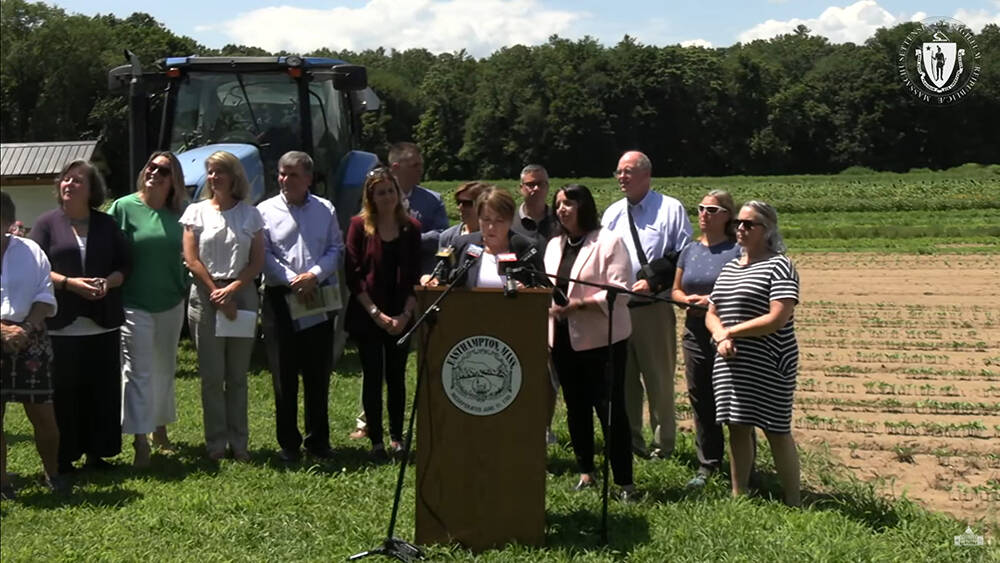Advertisement
Gov. Healey launches fundraiser to help flooded farms

Skeptical about the timeline for federal aid, the Healey administration on Thursday backed an effort to raise private donations to help farmers who sustained major damage in a series of flood-inducing storms.
The administration and United Way of Central Massachusetts on Thursday launched a fundraiser campaign, dubbed the "Massachusetts Farm Resiliency Fund," that will distribute grants to Bay State farmers to offset recovery costs in the wake of downpours that inundated fields and rendered crops unusable.
Speaking from Mountain View Farm in Easthampton, Healey said she is "not holding my breath" waiting for federal aid and instead wants to focus on bringing in donations to steer more immediate grants to those affected.
State officials will pursue federal disaster relief funds, and Healey said those dollars will be especially needed to fix damaged dams, bridges and culverts.
"But when it comes to our farms, the reason we set this up is because we need people to pitch in now while we pursue all of those other federal means," Healey said.
The campaign will solicit donations online.
At least 75 local farms, primarily in central and western Massachusetts, have been damaged by flooding following recent heavy rains, according to the Massachusetts Department of Agricultural Resources. Officials estimate about 2,000 acres of crops worth at least $15 million have been lost as a result.
In Greenfield, about 90,000 gallons of untreated sewage and waste overflowed along the Green River during a stretch of rain over the weekend.
Federal and state law prohibits crops from being used as food — whether sold or donated — when the edible portion has been exposed to flood waters, according to guidance that MDAR issued to farmers. Many crops that survived the deluge in New England still had to be destroyed due to the risk of contamination from floodwaters, which the guidance said can contain "manure or feces from upstream farms, septic or sewage systems, agricultural chemicals, pesticides, or other chemical contaminants, fuel and heavy metals, and microbial pathogens."
Healey said the flooding led to "tremendous devastation."
"This has had a disproportionate adverse impact on farmers in western Massachusetts and central Massachusetts, but to be clear with the people of Massachusetts, this is an issue that all 351 cities and towns own," Healey said. "We have to see that in this experience, so much else is implicated and disrupted, particularly around food security, but also around economic development. We do not need our farmers, who provide so much and are such an important cog in our infrastructure, to go away, to disappear as a result of the severe financial distress that they're under."
The governor also linked the flooding to the growing frequency of severe weather due to climate change.
"We've had severe weather. It's not surprising given what we've seen across the country and across the world when it comes to climate, and with these serious weather events and ever-changing weather events come real consequences," Healey said. "Unfortunately, most unfortunately, those consequences were felt in very real ways over the last 11 days by folks in western Massachusetts and central Massachusetts."
Healey's office described the fund as a "partnership between philanthropic organizations and private foundations" that would focus both on recovery from recent storms and making farms more resilient in the long run.
Lt. Gov. Kim Driscoll said the fund is launching with almost $100,000 secured so far from private philanthropy, and the fundraising page signals the goal is "to raise $15 million."
Healey did not detail any plans to put state dollars toward the fund, other than an initial $10,000 donation from Attorney General Andrea Campbell's office. In a statement provided by Healey's office, Campbell said that money is "all from settlements reached by this office" without offering specifics.
"The recent devastation to farms in Western Massachusetts has threatened both farmers' livelihoods and our local economy," Campbell said.
Rep. Natalie Blais, who represents 17 Franklin County towns and part of Greenfield, proposed launching an "Agricultural Disaster Relief Fund" with $20 million from the state as part of a supplemental budget the House approved last week, but top Democrats decided against including the idea in a mega-amendment following closed-doors negotiations.
Northampton Sen. Jo Comerford indicated Thursday that she is working with top Senate Democrats "to include additional significant funding for farm relief in the coming days."
Beacon Hill has been under pressure in recent months to make more aid available to those in need, particularly as pandemic-era federal dollars dry up. Policymakers have used state money to extend a free meals program for all students, keep food benefits at a higher level for several months, and keep grants flowing to child care providers.
Earlier on Thursday, Healey announced $26 million in grants through a pandemic-era program combatting food insecurity.
MDAR Commissioner Ashley Randle thanked the United Way of Central Massachusetts community organization for "being willing to run with this crazy idea we had earlier this week."
"All of us are consumers here, and we depend upon our farmers and the local food system. When the local food systems becomes as vulnerable as it does due to climate change, this is our opportunity to step up and come together and be more resilient going forward," Randle said. "The Massachusetts Farm Resiliency Fund is meant exactly to do that: to help farmers now in their time of need, but thinking long-term, how we can be prepared for more events like this."